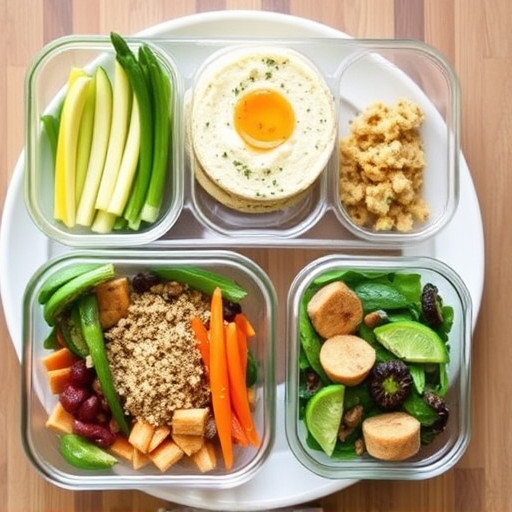
The Mediterranean diet emphasizes nutrient-rich foods like fruits, vegetables, whole grains, lean proteins, and healthy fats, promoting balanced meals and social mealtimes. Prep your kitchen with staples like olive oil, quinoa, herbs, spices, and canned goods to replicate traditional Mediterranean cuisine. Plan weekly meal plans incorporating diverse food groups for optimal nutrition while enjoying the cuisine's flavors. Adopt healthier cooking methods like roasting, grilling, and steaming to preserve ingredients' natural tastes and nutrients. Integrate regular physical activity into your routine with activities like walking, cycling, or strength training 2-3 days a week for overall well-being.
Adopting a Mediterranean diet can be a delicious and healthy journey. This ancient eating pattern, inspired by the dietary habits of countries bordering the Mediterranean Sea, emphasizes whole foods like fruits, vegetables, legumes, whole grains, nuts, and olive oil. In this guide, we’ll walk you through preparing for this lifestyle change, covering everything from understanding the core principles to stocking your kitchen with the right ingredients and planning balanced meals. Let’s embark on a flavorful path to better health.
- Understand the Mediterranean Dietary Pattern
- Stock Your Kitchen with Essential Ingredients
- Plan Balanced Meals and Snacks
- Embrace Healthy Cooking Methods
- Incorporate Physical Activity into Your Routine
Understand the Mediterranean Dietary Pattern

The Mediterranean diet is more than just a way to eat; it’s a lifestyle inspired by the traditional dietary patterns of countries bordering the Mediterranean Sea, like Greece, Italy, and Spain. This diet emphasizes a balance between plant-based foods, healthy fats, lean proteins, and whole grains. It encourages consuming plenty of fruits, vegetables, legumes, nuts, seeds, and olive oil while limiting red meat, processed foods, and added sugars.
This dietary pattern promotes moderate eating without strict restrictions, focusing on enjoying meals with family and friends. The key is to choose nutritious foods that are rich in beneficial nutrients, support overall health, and can be easily integrated into daily routines. By understanding these principles, you lay the foundation for adopting a Mediterranean-style diet and reaping its numerous health benefits.
Stock Your Kitchen with Essential Ingredients

When prepping for a Mediterranean diet, stocking your kitchen with the right ingredients is the first step to success. Focus on whole foods and fresh produce that are abundant in this culinary tradition. Fill your pantry with staples like olive oil, quinoa, brown rice, whole wheat pasta, and various nuts and seeds. These provide essential nutrients and form the base of many meals.
In addition, ensure you have a variety of herbs and spices, such as oregano, basil, rosemary, and garlic, which lend unique flavors to dishes without the need for excessive salt or sugar. Canned tomatoes, beans, and olives are also valuable additions, offering convenience while capturing the essence of Mediterranean cooking.
Plan Balanced Meals and Snacks

When preparing for a Mediterranean diet, planning balanced meals and snacks is key. This means incorporating a variety of foods from all food groups, just like in the traditional Mediterranean cuisine. Focus on filling half your plate with fruits and vegetables, a quarter with whole grains, and the remaining quarter with lean proteins or healthy fats. Include legumes, nuts, seeds, olive oil, fish, poultry, dairy (in moderation), and eggs for a well-rounded diet.
Consider creating meal plans for the week ahead, ensuring each day’s meals and snacks adhere to this balance. For example, breakfast could be oatmeal topped with nuts and fresh fruit, while a mid-morning snack might be a handful of mixed nuts and dried fruits. Lunch could feature quinoa salad with chickpeas and vegetables, followed by Greek yogurt with honey and walnuts for dessert. This approach ensures you’re nourished throughout the day while enjoying the delicious flavors and textures that the Mediterranean diet has to offer.
Embrace Healthy Cooking Methods

When transitioning to a Mediterranean diet, one key change is adopting healthy cooking methods. This involves moving away from high-heat cooking techniques like frying and opting for more gentle approaches that preserve the natural flavors and nutrients of ingredients. Roasting, grilling, steaming, and sautéing are excellent alternatives that can create delicious meals while promoting better health.
Focus on using olive oil as your primary cooking fat, as it’s a staple in Mediterranean cuisine and offers numerous health benefits. Incorporate these new methods into your weekly meal plans by trying simple recipes like roasted vegetables, grilled fish with lemon and herbs, or steamed seafood paella. Not only will these changes enhance the taste of your dishes, but they’ll also contribute to a healthier lifestyle overall.
Incorporate Physical Activity into Your Routine

Incorporating regular physical activity is an integral part of adopting a Mediterranean diet lifestyle. This doesn’t necessarily mean you need to rush to the gym; instead, focus on incorporating movement into your daily routine. Walking, cycling, swimming, or even gardening are excellent ways to get your body moving and your heart pumping. Aim for at least 150 minutes of moderate-intensity aerobic activity or 75 minutes of vigorous activity each week, as recommended by health guidelines.
Additionally, consider incorporating strength training exercises two days a week. Building muscle is beneficial for overall health and can help with weight management, which is important when aiming to follow a balanced Mediterranean diet. Start with simple bodyweight exercises like push-ups, squats, and lunges, or invest in some free weights and resistance bands to add variety to your workouts.
Adopting a Mediterranean diet is not just about food; it’s a lifestyle that prioritizes balance, freshness, and connection to nature. By understanding the core principles, stocking your kitchen with wholesome ingredients, planning nutritious meals, embracing healthy cooking methods, and incorporating regular physical activity, you can embark on a journey towards improved health and well-being, enjoying every delicious step of the way.






